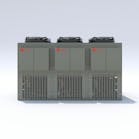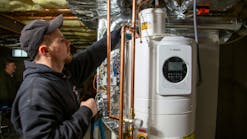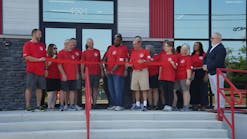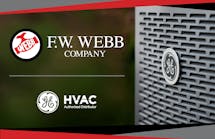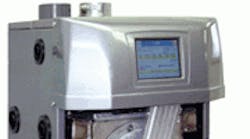For HVACR wholesalers who want to set themselves apart from competitors, hydronics is fast becoming a way to establish that difference. With clean and comfortable heating, instantaneous hot water and energy efficiency, hydronic systems are poised for growth in the U.S. market.
Hydronics is a different way of thinking about HVACR, says Chuck Brewer, vice president of sales for NY Thermal (NTI), a St. John, New Brunswick, Canada, company that manufactures hydronic boilers and furnaces. Thinking differently requires lots of educating, training and marketing by Brewer and his team of salespeople. They have to explain the benefits of hydronics for consumers and the success that wholesalers and contractors can enjoy by selling and installing such systems. Once they understand the value of hydronic systems, they become true believers.
“It's a more elegant heating solution for any home rather than most of the alternatives in the market,” says Brewer. “It's about comfort, health and efficiency.”
When wholesalers and contractors understand hydronics, they also become believers of NTI products. The company has been in the hydronics business for more than 40 years, and its laboratory and training facilities continue to develop home heating and commercial hydronic equipment that is innovative and energy efficient. NTI also maintains a robust network of sales and technical support for wholesalers and contractors.
So what is hydronics, and why does it perform so well for homeowners? As its name implies, hydronics relies on water, more specifically hot water, to heat the home. A gas-, oil- or wood-fired boiler heats water, which then circulates through the home via underfloor tubing, slim baseboard radiators or decorative wall panels. The water then returns to the boiler for reheating and recirculation. Water is the most efficient way to transfer heat, says Brewer, and therefore high-efficiency boilers can save homeowners up to 40 percent on their fuel consumption.
Because water is an excellent conductor of heat, it releases heat gradually when it passes through the radiator in each room, creating heat that is comfortable and evenly distributed. “When you look at a standard system with a gas furnace, the contractor must add humidifiers to the system to maintain comfort and healthy humidity levels because you're taking humidity out of the air due to the method of heat exchange,” Brewer notes. “With a hydronic system, you don't take the humidity out of the air. It's radiant heating.”
Many of NTI's gas boilers also offer the dual benefits of being the source for efficient, instantaneous domestic hot water without taking up additional space. NTI “combi” boilers with brazed-plate heat exchangers provide domestic hot water more efficiently than having a separate hot water heater for homes or commercial needs. There are also dual-rated boilers that are certified as high-efficiency boilers and large-volume flow-through water heaters for large-load domestic needs or commercial applications, such as laundromats and car washes.
Hydronic systems have come a long way in recent years, and NTI has been a leader in these innovations. The Matrix, which NTI introduced three years ago, is an integrated mechanical heating system that incorporates a 95%+ AFUE condensing instantaneous water heater, a 95%+ AFUE condensing hydronic furnace, a 95%+ AFUE condensing boiler and a heat recovery ventilator. It is also pre-wired to integrate third-party indoor coils for matching condenser or heat pump combinations.
Such innovations are “creating a lot of excitement” throughout the supply chain, Brewer says. Contractors and engineers in nontraditional hydronic markets like the South are beginning to embrace the possibilities that hydronics offers and are asking wholesalers to carry hydronic systems. “Hot water is required everywhere,” he adds.
Page 2 of 2
Kevin Dennison, NTI's president and second-generation owner of the family-run business, is “an inventor at heart,” Brewer says. “He's always looking for different ways to find solutions for hot water or heating or indoor air quality.” The government of New Brunswick named NTI as one of that province's most innovative companies of 2008 and presented Dennison with its Innovation Award for the Matrix.
Hydronics is an environmentally friendly system, but Brewer says being “green” is no longer a unique selling point. “It's the price of admission now,” Brewer says of systems that produce less greenhouse gas. “It's like having a competitive price. Today, it's an expectation by the wholesaler and the contractor that what they're selling and installing is going to be highly efficient and reduce contribution to greenhouse gases.”
So Brewer and his sales team go back to what sells HVACR systems: comfort and energy savings. Hydronic systems may have cost more a couple of years ago, but Brewer notes that the new efficiency requirements have made hydronic heating costs more attractive versus traditional split-system heating.
Even during a down economy, hydronic systems are a market segment exhibiting double digit, year-over-year growth. As the economy begins to pick up, NTI anticipates even greater growth in hydronics, and it intends to be ready. NTI recently opened a 72,000-square-foot facility in St. John for production, training and research, hired a training manager and expanded its sales staff. “We're investing in this market and anticipating growth as far out as we can see,” Brewer says. For wholesalers who don't offer hydronics products, now is the time to think about offering new solutions, he says.
Training and education continue to be a major part of what NTI does. Brewer likens hydronics to a religion — once wholesalers and contractors become converted, they are true believers. It's up to Brewer and his staff to get more people to go to church. “It's a never-ending telling of this story,” Brewer says. “Changing a contractor's way of doing business requires a change in their mind-set of how they choose to provide heating solutions to their customers.”
To that end, NTI's sales team spends much of its time on the road, meeting with wholesalers, training wholesale and contractor personnel, working directly with contractors and attending trade shows. They provide training and education in the field, live online, via canned programs and on DVDs and computer flash drives to educate and inform customers about NTI products as well as the benefits of hydronic heating in general.
“In many markets, hydronic heating is considered a new technology,” Brewer acknowledges. “You have to learn pumping, zoning, valves, manifold solutions and calculate water flow. It's learning new solutions. But the contractors that have made the switch, with help from their wholesalers and from us, have found that there's money to be made. It's a profitable differentiator, whether you're a contractor or a wholesaler. Wholesalers tell us they make 25% — 30%+ on hydronics sales.”
NTI spends a lot of time with contractors, in particular, because they are the ones who have the greatest influence on end users. “When contractors believe in radiant and hydronic heating, they are successful in selling the attendant benefits to the consumer,” Brewer says.
Hydronics offers wholesalers new opportunities that may have been unavailable to them. He cites some very good NTI wholesalers in the Rocky Mountain region who have large territories to themselves. They've done their homework, and their employees are well-trained, so when a customer calls or comes through the door, the sale is already made. Says Brewer: “The successful wholesalers are selling the value.”
Michael Maynard is a business writer based in Providence, RI. He writes frequently on HVACR, construction and architecture issues. Contact him at [email protected].
